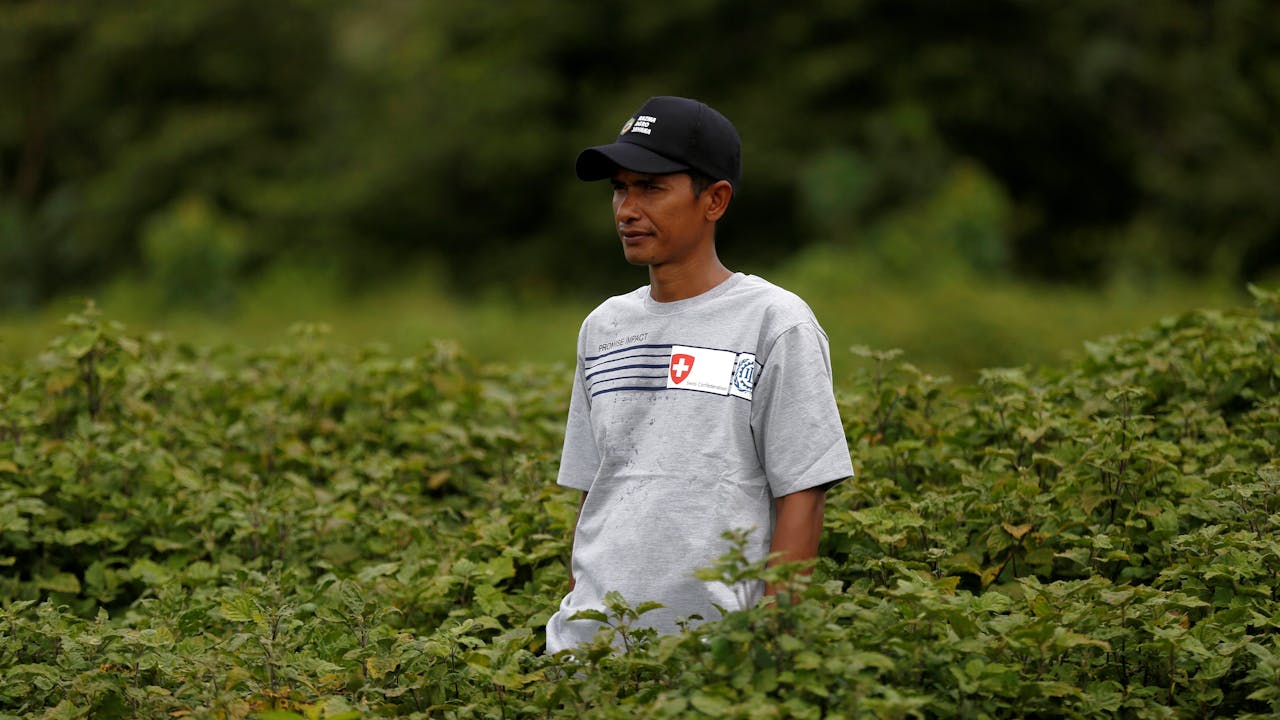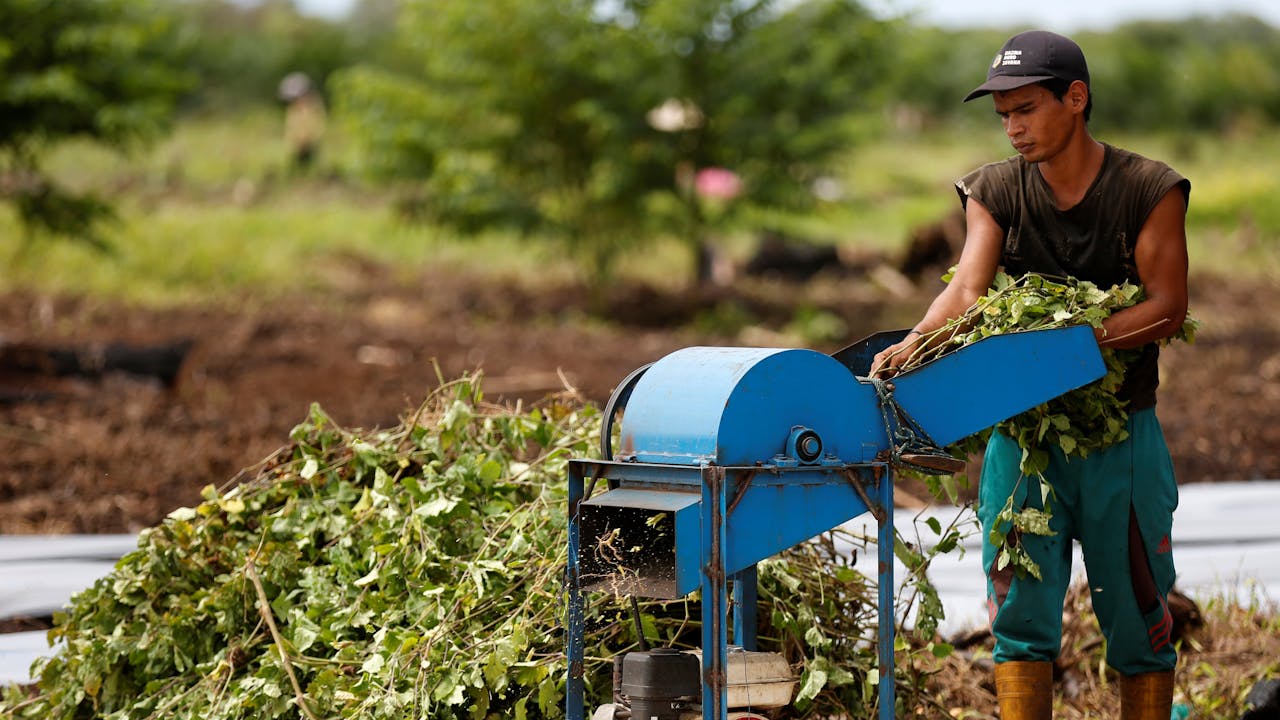I have had many jobs in my life. But I am a farmer’s child and now I am a farmer myself. I have been planting patchouli and producing patchouli oil for around two years. In the past, my family suffered from the instability of this sector. One day, I hope to ensure that patchouli farming provides decent work, not only for myself and my family, but also for others, especially young people.
My name is Teuku Razuan. I am 38 years old and I am from Aceh Jaya in Indonesia. I am the second child of ten siblings.
When I was growing up, our family life was among the simplest in the village. Until my teenage years, our house didn’t even have electricity. But my father had one strength. He raised all of us with great discipline.
Back then, my parents had two professions. They were fishermen for half the day and farmers for the rest. In my village, most of the community lived like that.
I also experienced both professions during my teenage years. But eventually, farming became my life.
My grandmother also used to farm patchouli. In her time, the conditions were very difficult. There were no national roads in our area and agriculture was not very advanced.
By my father’s generation, the conditions had improved significantly. From 1997 to 1999, patchouli was one of the most promising commodities for our region. As far as I remember, there wasn’t a single family in our area that didn’t grow patchouli.
Before the rise of patchouli farming, only one or two people in the village had a motorcycle. When the price of patchouli increased, almost every household was able to buy a motorcycle.
But then, in 1999, the price of patchouli collapsed.
My father had planted patchouli and the investment costs were high. When it was time to harvest, we couldn’t even recover the cost of the seedlings. For many people in our community, that trauma remains to this day.

In the 1990s, patchouli farming felt like a breath of fresh air, a promising hope. But when prices collapsed, there was no community support. It was heartbreaking. (Indonesia, 2025)
© ILO/Hotli SimanjuntakMy father was someone with a strong mentality. He rarely complained. When patchouli prices plummeted, my father immediately shifted to cultivating corn and continued farming.
Those events taught me a lesson: nothing is completely stable. There are always ups and downs.
After completing school, I went on to study at university, but I was self-funded and busy with other things, and I didn't graduate. Then in 2016, I enrolled again and completed my degree. Now, I am pursuing a master's degree at the Syiah Kuala University.
Over the years, I have had many jobs. I have been a teacher and a police officer. I have worked in companies, and I have had several businesses. After 2017, I was appointed to the assistance team for the Governor of Aceh, and I was an advisor for the agricultural sector.
But whatever professions I did before, my goal was to make it here.
When patchouli prices plummeted, my father immediately shifted to cultivating corn... Those events taught me a lesson: nothing is completely stable.
Since I began farming around two years ago, my challenge has been to figure out how to make patchouli farming more sustainable.
To produce patchouli oil, there are three phases: planting and maintenance, harvesting and distillation. Each stage has its own process, and we are working to simplify these processes.
For example, we used to chop the plants manually with machetes. But now, we have a machine to do this. Before, it took ten people one day to collect 500kg of leaves. Now, the machine can process 2 tons of leaves in an hour.
Another challenge involved distillation. Before, we used a small-scale distiller, with a capacity of 30 to 40 kg and it took two or three months to distill the oil from 1 hectare of plants.
With the help of the Atsiri Research Center (ARC), we were able to get a bank loan and acquire a large-scale distiller, with a capacity of 300 kilograms. Our distillation process now only takes one week.

We must keep motivating the young people to achieve a bright future. It’s easier now they have seen the results of their friends. (Indonesia, 2025)
© ILO/Hotli SimanjuntakI am also working with the younger generation. I want to instill in them that we have something that is the best in the world: patchouli.
In the beginning, I tried to initiate a cooperative system with a 50:50 share of the profits. But the young people didn’t want that. They wanted me to guarantee that they would be paid for their work.
The first ones that I invited to the cooperative, mostly disbanded before planting. They took their seedlings and chose to manage the land by themselves. Only two stayed in the cooperative. But after the harvest, the ones who stayed found that their results were better than those who left, even after sharing profits.
In the following waves, we had no choice but to set a price for all the work. After harvesting, the young people also receive a 10% share of the profits.
The first two waves of the cooperative are independent now and they work on their own land, thanks to the capital they earned here.

I want to make it easier for patchouli farmers to access resources, like the “MyNilam” app launched by the ILO. Hopefully, our efforts will succeed, and we can become a reference for others. (Indonesia, 2025)
© ILO/Hotli SimanjuntakOne day, I was contacted by the International Labour Organization (ILO) about financial education training for the workers. I had often told the young people about keeping savings, but they usually spent their earnings immediately after planting.
Since the training, there has been a significant change. They have started to record expenses and make financial plans. We have high hopes for ILO to continue helping with this.
ILO has also provided the “MyNilam” application. It measures the production of patchouli in Aceh, which could help stabilize prices. For now, it’s just starting. But we hope it will be an extraordinary contribution to farmers.
Patchouli is already a leading sector in our region, but I want to develop it further to ensure it is sustainable for farmers.
When I see farmers in other regions prospering, I want to learn where our shortcomings are and what are our strengths.
Patchouli is already a leading sector in our region, but I want to develop it further to ensure it is sustainable for farmers.
The next step is to keep developing. From the traditional farming system, we are upgrading to more intensive farming, and from manual tools, we are upgrading to more modern tools.
I feel proud to continue something like this and maintain its excellence. I also feel proud to play a role in helping to educate young people, just as I was educated by my elders.
